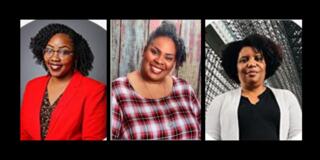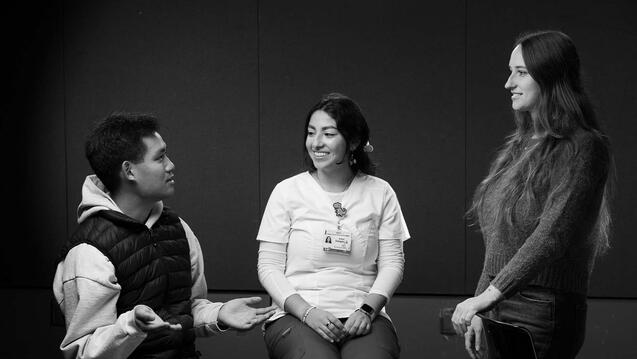Elevating Marginalized Voices in Academe

We are excited to celebrate the publication of Elevating Marginalized Voices in Academe: Lessons for a New Generation of Scholars.
The book was edited by University of San Francisco School of Education alumni Emerald Templeton EdD '18 (Organization and Leadership program), Bridget H. Love EdD '17 (International and Multicultural Education program) and Onda Johnson EdD '18 (Organization and Leadership program).
“Lessons is an anthology of narratives from Scholars of Color about traversing doctoral studies in American higher education,” explains Love. “With each chapter representing a letter written to the increasingly demographically diverse students entering the academy, this edited volume will underscore experiences, challenges, how-to’s, and validations from Scholars of Color who have navigated predominantly and historically white institutions.”
Editor Bridget H. Love spoke with the School of Education and shared more about the inspiration for the book and the critical importance of the perspectives shared within. Check out the conversation, below.
How did this book come about?
"This work came about as we communed and shared our experiences in completing our doctoral studies at USF. Collectively, we navigated the elitism and marginalization of the academy while struggling to decenter the dominant narrative - a narrative that stifles the voices of Black, Indigenous, and people of color. This book of lessons provides a unique view into the academic lives of new scholars and challenges the idea of the 'traditional' graduate student, and subsequently who is recognized as a scholar."
Why is this book particularly important at this moment?
"This book addresses many of the social ills so blatant in life and media today: white supremacy, anti-Blackness, racism, and systemic oppression. This text is a beautiful opportunity to view these issues in the context of the oppressed - uplifting, empowering, and legitimizing their voices and stories.
This project is important as it fulfills the call from extant literature to uplift the voices of marginalized people. In Aaron Kuntz’s (2015) work on responsible methodology, he stresses the importance of truth-telling and risk taking in scholarly work by challenging the 'who,' 'how,' and 'why' as well as the 'what' in legitimizing scholarship. He carefully critiques the charge of the scholarly community to conduct scientific inquiry and suggests that such a focus on procedure misses out on the transformative power of scholarship. Scholars have 'an ethical duty to tell critical truths' by 'interrogating the normative means of coming to know,' (Kuntz, p. 103). It is our intent to bolster the voices of People of Color through this work and the ways in which they have come to know what it means to be a scholar in an elite academy that was not meant for them. While this book is not empirically-based in format or style, the essence of its contents is qualitative as we seek to uncover the thick, rich narratives that come by way of delving into the personal stories of trials, tribulations, and triumphs. As described by Kuntz, the power of unveiling these narratives is an intimate act situated between truth-telling and activism. To that end, Lessons demonstrates how 'good qualitative inquiry does more than describe; it intervenes on multiple material levels' (Kuntz, 2015, p. 68).
Similarly, Collins’ (2000) work on Black Feminist Thought highlights the need to center the voices of the marginalized in places where they’ve been silenced. She postulates that,
Oppressed groups are frequently placed in the situation of being listened to only if we frame our ideas in the language that is familiar to and comfortable for a dominant group. This requirement often changes the meaning of our ideas and works to elevate the ideas of dominant groups. (Collins, 2000, p. vii)
This book serves to elevate the stories of People of Color, whom have often navigated the throes of the academy in silence. In essence, this book is a way of reclaiming our voices and taking our rightful place within the scholarly community. Building upon Collins’ ideas, Lessons is an opportunity to showcase the expertise of recent doctoral candidates in the cultural knowledge and power they bring to scholarship through an accessible text.
We define the counter-story as a method of telling the stories of those people whose experiences are not often told (i.e., those on the margins of society). The counter-story is also a tool for exposing, analyzing, and challenging the majoritarian stories of racial privilege. Counter-stories can shatter complacency, challenge the dominant discourse on race, and further the struggle for racial reform. (Solorzano & Yosso, 2002, p. 32)
This is an intentionally accessible text: chapters are written in first person covering a broad range of experiences, advice, and insights from the writer’s own encounters as a Person of Color in doctoral studies."
What is your hope for the impact of this book?
"We hope this book reaches far and wide and serves to not only share the narratives of Scholars of Color as an avenue of encouragement, but as a tool for unlearning and resistance."
About the Book:
Emerald Templeton, Bridget H. Love, and Onda Johnson are three Black women scholars who found the tools to navigate their doctoral studies through self-definition, community, and a fervent hope for a more just future. All having completed their doctorates at the University of San Francisco in the School of Education, they’ve brought a combination of experiences in student affairs, government administration, college teaching, and k-12 education to partner on the completion of this project.
We understand anti-Blackness as the epistemic, ontological, spiritual, and ideological assaults on Black people in and beyond the educational context. We are not confused--in this moment, socially, there is renewed energy espousing a commitment to Black people. Statements have been made. Posts and tweets abound. Monuments once defended are being relocated. Recent occurrences of social unrest (past 100 years) serve to amplify the need for curricular and pedagogical tools in contrast to societies’ seeming ease of response to the death of Black people than it is to love, plan for, lift, and protect the living, breathing, and fullness of Black life.
Lesson is a collection of voices across disciplines and is a targeted effort to provide trans-disciplinary experiences of Students of Color, which is difficult to find in one place. This work curated by the editors provides a resource that is easily accessible and has permanence through print. In the format of a book of vignettes, students and faculty will be able to read this book story-by-story alongside other materials throughout an academic term, or in sum as a means for understanding the experiences of Students of Color.
Lessonsaims to affirm the voices of scholars who have existed on the margins while creating a pathway for new scholars. From the personal to professional, these words of wisdom and encouragement are useful anecdotes that speak to the practitioner and academic. As Black women in the academy, either faculty members or students, we recognize the need for engaged scholarship. It is our hope that this work will encourage others to move forward in solidarity, service and professional success as an extension of our alma mater's motto, “Change the World from Here”. We are changing the world one story at a time told in our own voices. We are scholars and we want others to recognize the diversity that exists in scholarship.
Indicative Bibliography:
- Hill Collins, P. (2000). Black feminist thought knowledge, consciousness, and the politics of empowerment. Retrieved from http://public.eblib.com/EBLPublic/PublicView.do?ptiID=178421
- Kuntz, A.M. (2015). The responsible methodologist: Inquiry, truth-telling, and social justice. Walnut Creek, CA. Left Coast Press, Inc.
- Solorzano, D. G., & Yosso, T. J. (2002). Critical race methodology: Counter-storytelling as an analytical framework for education research. Qualitative Inquiry, 8(1), 23–44.
To celebrate the release of Lessons, a virtual book launch event was hosted in May 2021. Learn more about the book by watching a recording of the launch event here.
Lessons can be purchased from Routledge, Amazon, Barnes & Noble, and Marcus bookstores.


